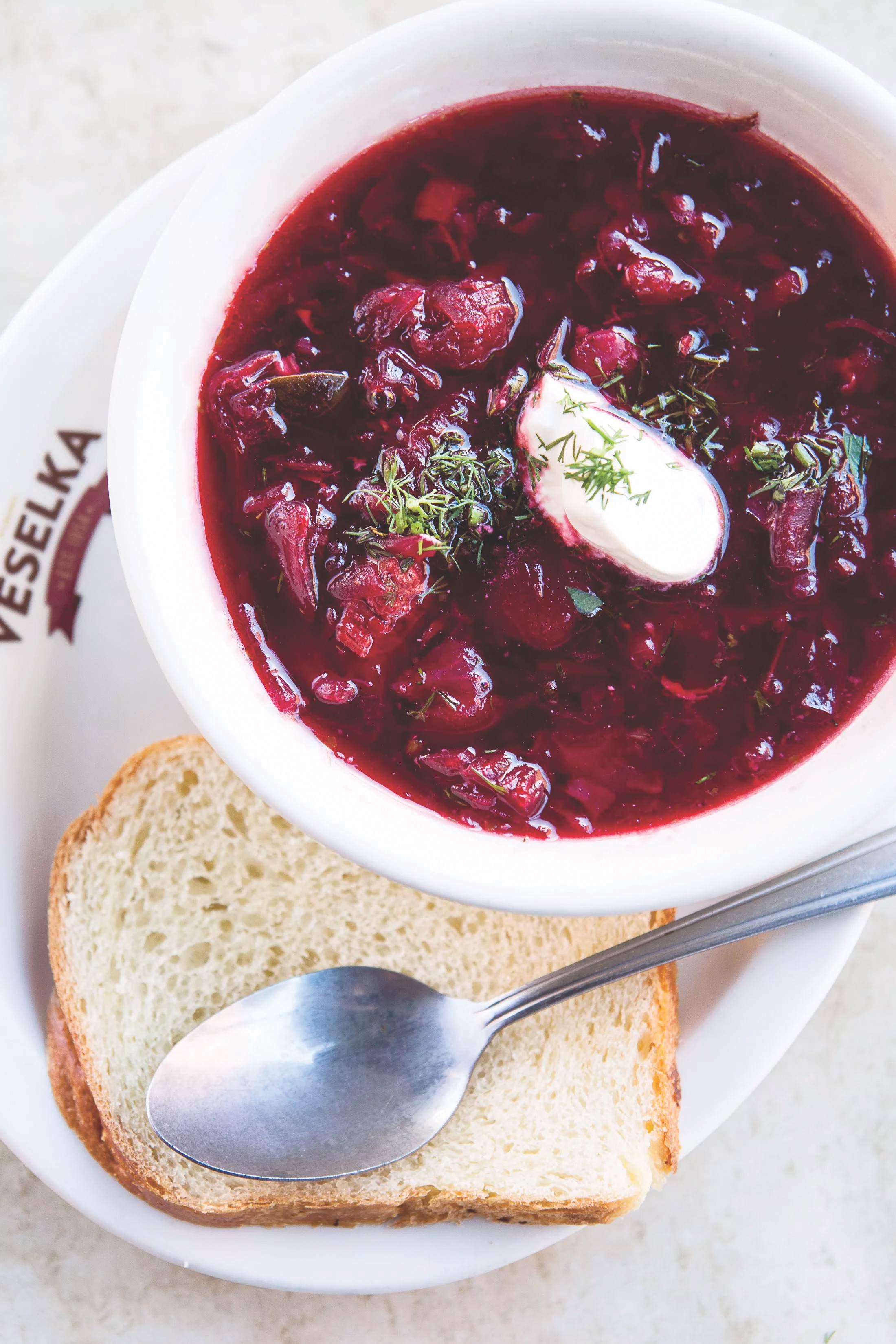
Perhaps one of the most surprising things about my visit to Veselka, a renowned Ukrainian restaurant on Manhattan’s very Jewish-centric Lower East Side, is that the restaurant is, in fact, not Jewish. After my many visits to Veselka over the years, so many bowls of matzo ball soup and having eaten more than my weight in pierogi and potato pancakes, I guess I just assumed it was a Jewish restaurant. To add to my confusion, a larger-than-life “Happy Challahdays” sign is one of the first things you notice when you walk into the buzzing luncheonette.
That’s the thing about New York and Jewish food. Words like shlep and schmear and farkakteh are such an integral part of the everyday New Yorker’s lexicon, sometimes it’s hard to imagine that the whole city is not just one big Jewish enclave.
I once read that the Lower East Side of Manhattan is considered the “Plymouth Rock of American Jewry.” When you consider that five out of six American Jews have origins in Eastern Europe, the vast majority of whom immigrated to cities and towns on the East Coast, it stands to reason that Jewish influence would have tremendous impact on the food and culture.
Because food is the greatest and most powerful unifier, imagine the joy hundreds of thousands of Eastern Europeans felt for that shared cuisine when Veselka opened in 1954 as a small newspaper, candy and cigarette stand. With only six stools in the original U-shaped diner, it began to sell sandwiches and coffee as well as Ukrainian specialties such as pierogi and borscht to meet the demand of the more than 60,000 Ukrainian immigrants who called the area their home at the time.
Words like shlep and schmear and farkakteh are such an integral part of the everyday New Yorker’s lexicon, sometimes it’s hard to imagine that the whole city is not just one big Jewish conclave.
Germans, Italians, Poles — Jews and non-Jews alike — made up the fabric of the neighborhood in the 1950s and contributed rich and diverse dishes from their homelands.
This is one of the many reasons to love this part of New York City. Even with the city’s neverending push to reinvent itself, phasing out the mom-and-pop diners and gentrifying neighborhoods whose inhabitants seem sewn into the landscape, there are and always will be gems like Veselka that serve the kind of soul food that manages to pull the heartstrings at first bite.
Although Veselka’s renowned borscht is made with pork butt and topped with sour cream, making it doubly unkosher, I was lucky enough to be there to watch its equally iconic Christmas borsht prepared. Ukrainian and Polish Christmas Eve is a fasting day when no meat is consumed. But the day culminates in a 12-course feast of which the first course is always vegetarian Christmas borscht. This works perfectly for Jews as well because a fabulous big bowl of “Veselka Red” just begs for a heaping dollop of sour cream and chopped dill.
Veselka’s Christmas borscht is served with dreamy little mushroom-and-onion dumplings called vushka (tiny ears in Ukrainian.) We will leave those for another day, but I’ve found that adding some sliced porcini or portobello mushrooms to the borscht will approximate the texture and contrast nicely with the earthy beet stock. Also, as a departure from Veselka’s recipe and Christmas borscht in general, I like to add back in some of the beets as well as all of the vegetables because I like my soup chunky. Feel free to follow the recipe exactly if you prefer a more brothlike soup.
Don’t get overwhelmed by the number of steps in this recipe. They are all very simple, and the soup itself can be prepared over a few days if you wish. It also freezes beautifully. Feel free to use chicken or beef stock in place of vegetable stock, and then perhaps use an inferior but better-than-nothing nondairy sour cream alternative.
Any way you want to make this soup, though, know that it’s much more than just a bowl of ruby red beets and humble vegetables. It’s the shared dreams and goals of the people of ancient lands and common heritage who happened to find themselves pressed together in the little bubble that is the Lower East Side.
VESELKA’S
CHRISTMAS BORSCHT
(Adapted from “The Veselka Cookbook” by Tom Birchard and Natalie Danford (Thomas Dunne Books, 2009)
2 pounds beets, trimmed and scrubbed,
unpeeled (small, young beets are best)
¾ cup white or apple cider vinegar (if you are sensitive to the taste of vinegar,
reduce the amount but don’t leave it out entirely as it keeps the beets their vibrant red color)
4 cups water
1 carrot, peeled and diced
1 stalk celery, diced
1 medium yellow onion, diced
1 cup porcini or white button mushrooms,
sliced (optional)
4 cups vegetable stock
2 bay leaves
5 whole allspice berries
1 teaspoon sugar, more to taste
1 garlic clove, finely chopped
1 ½ teaspoons freshly ground
black pepper
1 ½ teaspoons salt, more to taste
3 tablespoons fresh dill, finely chopped,
for garnish
4 tablespoons sour cream or crème
fraiche, for garnish
Coarsely chop the beets in a food processor. In a medium pot, combine beets, vinegar and 4 cups of water and bring to a boil. Reduce heat and simmer, uncovered, until beets are soft, about 45 minutes. Strain and set aside juice. Veselka uses these cooked beets for its wonderful beet salad. I like to put half of them back into the stock and eat them in the soup.
In another medium pot, add carrot, celery, onion, mushrooms (if using), vegetable stock, bay leaves and allspice berries, and bring to a boil. Reduce heat and simmer, uncovered until vegetables are soft, about 30 minutes. Strain and discard vegetables and aromatics. Again, Veselka discards the vegetables. I don’t. Rather, I pick out the bay leaves and allspice berries and keep the vegetables.
Combine strained stock and beet juice and simmer 5 minutes. Add sugar, garlic, black pepper, and season with sugar and salt to taste. Serve with half the beets, the vegetables and sprinkled with dill. Top with sour cream if desired.
Makes 4 to 6 servings.























 More news and opinions than at a Shabbat dinner, right in your inbox.
More news and opinions than at a Shabbat dinner, right in your inbox.